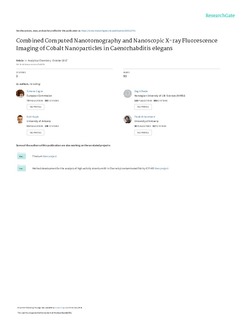Combined computed nanotomography and nanoscopic X-ray fluorescence imaging of cobalt nanoparticles in Caenorhabditis elegans
Cagno, Simone; Brede, Dag Anders; Nuyts, Gert; Vanmeert, Frederik; Pacureanu, Alexandra; Tucoulou, Remi; Cloetens, Peter; Falkenberg, Gerald; Janssens, Koen; Salbu, Brit; Lind, Ole Christian
Journal article, Peer reviewed
Accepted version
Permanent lenke
http://hdl.handle.net/11250/2574788Utgivelsesdato
2017Metadata
Vis full innførselSamlinger
Sammendrag
Synchrotron radiation phase-contrast computed nanotomography (nano-CT) and two- and three-dimensional (2D and 3D) nanoscopic X-ray fluorescence (nano-XRF) were used to investigate the internal distribution of engineered cobalt nanoparticles (Co NPs) in exposed individuals of the nematode Caenorhabditis elegans. Whole nematodes and selected tissues and organs were 3D-rendered: anatomical 3D renderings with 50 nm voxel size enabled the visualization of spherical nanoparticle aggregates with size up to 200 nm within intact C. elegans. A 20 × 37 nm2 high-brilliance beam was employed to obtain XRF elemental distribution maps of entire nematodes or anatomical details such as embryos, which could be compared with the CT data. These maps showed Co NPs to be predominantly present within the intestine and the epithelium, and they were not colocalized with Zn granules found in the lysosome-containing vesicles or Fe agglomerates in the intestine. Iterated XRF scanning of a specimen at 0° and 90° angles suggested that NP aggregates were translocated into tissues outside of the intestinal lumen. Virtual slicing by means of 2D XRF tomography, combined with holotomography, indicated presumable presence of individual NP aggregates inside the uterus and within embryos. Combined computed nanotomography and nanoscopic X-ray fluorescence imaging of cobalt nanoparticles in Caenorhabditis elegans

